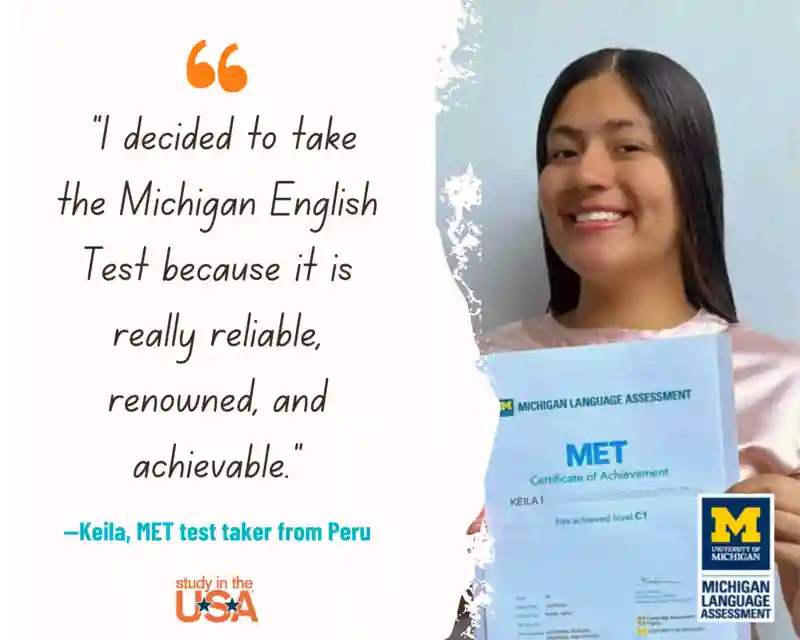The SAT® Your Bridge to Studying in the US

Who Should Take the SAT® and SAT Subject Tests™?
Students applying to a four-year undergraduate program at a college or university in the United States are required to take an admission test such as the SAT.
Administered in over 175 countries, the SAT is integral to your dreams of studying abroad. Many four-year colleges or university in the United States requires a standardized entrance exam as part of the admission process. Most selective universities require or recommend a test with writing, like the SAT, and most highly selective universities also require SAT Subject Tests. The SAT is also recognized as an admission credential for international students at most prominent universities outside the U.S. (including Canada, Australia, the United Kingdom and others) that offer instruction in English.
The SAT consists of multiple-choice questions and an essay section that measures the skills you've developed in high school and your ability to apply those skills. SAT scores help universities make informed admission decisions by providing one indicator of your academic readiness to do university-level work. SAT scores also help students determine the universities where they are most likely to be successful. Though the SAT provides an international benchmark to compare students across the world, you should remember that the SAT is just one of many factors that universities consider when making admission decisions.
SAT Subject Tests are offered in a variety of subject areas including English, mathematics, science, foreign languages, literature and history. Many universities either require or recommend SAT Subject Tests for admissions, achievement or placement purposes. Even if a university does not require SAT Subject Tests, they can help students stand out in the admission process and demonstrate readiness for specific majors or programs in college. When considering Subject Tests, you should particularly consider subject areas that you like or in which you excel.
What Does the SAT Test Measure?
The SAT consists of three sections: - critical reading, mathematics and writing. Each section is scored on a scale of 200-800.
The Critical Reading Section tests your ability to understand university-level passages written in English. The questions in this section will ask you to complete sentences with the appropriate word or words or to answer questions that show your comprehension of short and long reading passages.
The Mathematics Section assesses how well you analyze and solve problems – skills you learned in school that you’ll need at university. It includes questions that ask you to work with algebraic formulas, linear functions, exponential growth and manipulations with exponents, properties of tangent lines, absolute value, functional notation, geometric figures, probability, and to analyze data.
The Writing Section includes multiple-choice questions to test how well you use standard written English. You will also be required to write a brief essay.
How does the Writing Section Impact Students for Whom English is a Foreign Language (EFL)?
EFL students perform just as well or better on writing assignments than they do on other verbal measures. Essay topics are selected to be accessible to the general test-taking population, including EFL students. The essay is scored holistically, that is, based on the overall quality of the essay and your demonstration of writing competence. Even with some errors in spelling, punctuation, and grammar, you can still get a top score on the essay.
SAT Subject Tests
SAT Subject Tests are one-hour tests designed to measure your knowledge and skills in particular subject areas, as well as your ability to apply that knowledge. They are offered in Biology, Chemistry, Physics, Mathematics, Spanish, French, Chinese, Japanese, Korean, German, Italian, Latin, Modern Hebrew, Literature, U.S. History and World History.
Many colleges and universities use the SAT Subject Tests to make admission decisions, for course placement and to advise students about course selection. Check with the universities where you may apply to learn their requirements or recommendations for SAT Subject Tests.
You may take up to three SAT Subject Tests on a single test date. The best way to prepare for the SAT Subject Tests is to keep up with your school coursework. In addition, tools to help you practice for the tests, including sample test questions, explanations, and information on test timing and scoring, are available for free at sat.org/practice.
How Should You Get Ready for the SAT?
The best way to get ready for the SAT is to participate actively in your own education. Take challenging classes, read as much as you can in and out of school and practice your writing. It is a good idea for you to familiarize yourself with the SAT so you know what to expect on test day. Sample SAT questions, a full-length practice test, and many other resources are available for free online atsat.org/practice.
If you want more practice, you can also purchase a subscription to The Official SAT Online Course™ or purchase a copy of the College Board's best-selling The Official SAT Study Guide™. The online course offers 18 interactive lessons that prepare students for all the question types in the three sections of the SAT, including the essay.
Skills Insight is another free tool found on sat.collegeboard.org that you can use to get ready for the SAT. It helps you understand what skills are tested on the SAT and become more comfortable with the types of test questions you will see on test day.
How Long is the SAT?
The test is three hours and forty-five minutes. Accounting for breaks, check-in time, and pre-administration activities, you should plan to be at the test center for approximately five hours.
Where to Register
Online registration is the simplest and quickest way to register for the SAT. To register online, visit sat.org/
The remaining spring 2013 international test dates are May 3th, and June 7nd.
Student Search Service
Student Search Service is a free information service for students who take the SAT and SAT Subject Tests. By participating in Student Search Service, you can let colleges, universities, and scholarship programs know you are interested in hearing from them. It also enables you to receive educational and financial aid information from colleges, universities, and scholarship programs.
Scholarships
Many universities and educational programs use the SAT as part of awarding scholarships and forms of merit aid to international students. Additionally, the College Board's Scholarship Search features more than 2,300 sources of university funding, totaling nearly three billion U.S. dollars in available aid! Visit bigfuture.org
Administered in over 175 countries, the SAT is integral to your dreams of studying abroad. Many four-year colleges or university in the United States requires a standardized entrance exam as part of the admission process. Most selective universities require or recommend a test with writing, like the SAT, and most highly selective universities also require SAT Subject Tests. The SAT is also recognized as an admission credential for international students at most prominent universities outside the U.S. (including Canada, Australia, the United Kingdom and others) that offer instruction in English.
The SAT consists of multiple-choice questions and an essay section that measures the skills you've developed in high school and your ability to apply those skills. SAT scores help universities make informed admission decisions by providing one indicator of your academic readiness to do university-level work. SAT scores also help students determine the universities where they are most likely to be successful. Though the SAT provides an international benchmark to compare students across the world, you should remember that the SAT is just one of many factors that universities consider when making admission decisions.
SAT Subject Tests are offered in a variety of subject areas including English, mathematics, science, foreign languages, literature and history. Many universities either require or recommend SAT Subject Tests for admissions, achievement or placement purposes. Even if a university does not require SAT Subject Tests, they can help students stand out in the admission process and demonstrate readiness for specific majors or programs in college. When considering Subject Tests, you should particularly consider subject areas that you like or in which you excel.
What Does the SAT Test Measure?
The SAT consists of three sections: - critical reading, mathematics and writing. Each section is scored on a scale of 200-800.
The Critical Reading Section tests your ability to understand university-level passages written in English. The questions in this section will ask you to complete sentences with the appropriate word or words or to answer questions that show your comprehension of short and long reading passages.
The Mathematics Section assesses how well you analyze and solve problems – skills you learned in school that you’ll need at university. It includes questions that ask you to work with algebraic formulas, linear functions, exponential growth and manipulations with exponents, properties of tangent lines, absolute value, functional notation, geometric figures, probability, and to analyze data.
The Writing Section includes multiple-choice questions to test how well you use standard written English. You will also be required to write a brief essay.
How does the Writing Section Impact Students for Whom English is a Foreign Language (EFL)?
EFL students perform just as well or better on writing assignments than they do on other verbal measures. Essay topics are selected to be accessible to the general test-taking population, including EFL students. The essay is scored holistically, that is, based on the overall quality of the essay and your demonstration of writing competence. Even with some errors in spelling, punctuation, and grammar, you can still get a top score on the essay.
SAT Subject Tests
SAT Subject Tests are one-hour tests designed to measure your knowledge and skills in particular subject areas, as well as your ability to apply that knowledge. They are offered in Biology, Chemistry, Physics, Mathematics, Spanish, French, Chinese, Japanese, Korean, German, Italian, Latin, Modern Hebrew, Literature, U.S. History and World History.
Many colleges and universities use the SAT Subject Tests to make admission decisions, for course placement and to advise students about course selection. Check with the universities where you may apply to learn their requirements or recommendations for SAT Subject Tests.
You may take up to three SAT Subject Tests on a single test date. The best way to prepare for the SAT Subject Tests is to keep up with your school coursework. In addition, tools to help you practice for the tests, including sample test questions, explanations, and information on test timing and scoring, are available for free at http://sat.collegeboard.org/practice/.
How Should You Get Ready for the SAT?
The best way to get ready for the SAT is to participate actively in your own education. Take challenging classes, read as much as you can in and out of school and practice your writing. It is a good idea for you to familiarize yourself with the SAT so you know what to expect on test day. Sample SAT questions, a full-length practice test, and many other resources are available for free online athttp://sat.collegeboard.org/practice/.
If you want more practice, you can also purchase a subscription to The Official SAT Online Course™ or purchase a copy of the College Board's best-selling The Official SAT Study Guide™. The online course offers 18 interactive lessons that prepare students for all the question types in the three sections of the SAT, including the essay.
Skills Insight is another free tool found on sat.collegeboard.org that you can use to get ready for the SAT. It helps you understand what skills are tested on the SAT and become more comfortable with the types of test questions you will see on test day.
How Long is the SAT?
The test is three hours and forty-five minutes. Accounting for breaks, check-in time, and pre-administration activities, you should plan to be at the test center for approximately five hours.
Where to Register
Online registration is the simplest and quickest way to register for the SAT. To register online, visit http://sat.collegeboard.org/
The remaining spring 2013 international test dates are May 4th, and June 2nd.
Student Search Service
Student Search Service is a free information service for students who take the SAT and SAT Subject Tests. By participating in Student Search Service, you can let colleges, universities, and scholarship programs know you are interested in hearing from them. It also enables you to receive educational and financial aid information from colleges, universities, and scholarship programs.
Scholarships
Many universities and educational programs use the SAT as part of awarding scholarships and forms of merit aid to international students. Additionally, the College Board's Scholarship Search features more than 2,300 sources of university funding, totaling nearly three billion U.S. dollars in available aid! Visit www.bigfuture.collegeboard.org
The College Board
Get matched to the best program for you
Let us know what you're looking for so we can find the best school for you.
Useful Articles
Проверьте эти учебные заведения




East Los Angeles College
Typical cost per Semester: $10,000 — $15,000

University of North Georgia
Typical cost per Year: $15,000—$20,000

Santa Rosa Junior College
Typical cost per Year: $10,000 — $15,000
Start your U.S. adventure with Study in the USA

Learn About U.S. education financing, housing, and more
Resources
Learn about American culture and education direct from our experts at Study in the USA. Read more












